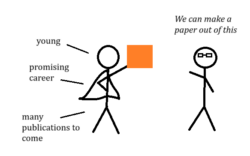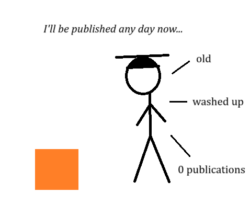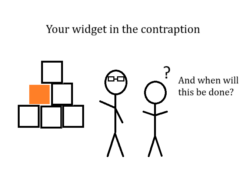
Photo by Sewupari Studio for Noun Project
Summer has officially come to an end, and with its departure a new semester dawns. And with a new semester come ripe opportunities, scholarly resolutions, and motivating little white lies. I myself have lain in bed the night before the start of classes committed to such delusions as “I will attend my 9:30 lectures” and “I will start my p-sets the day they are assigned.” However, you may find that the most wishful fantasies are served to you; those that have spent their summer UROPing will be familiar with promising speculation of future events: “Great work, we can turn this into a paper.”
| Expectation | Reality |
 |
 |
Like the little pre-semester promises we make to ourselves, these plans to publish can be more wishful thinking than substance. And for good reason: justifications for not publishing can be quite substantial. While your portion of a project may be completed, there can be other much larger pieces on much larger timeframes. Professors have many projects, and while your project may be your top priority it may be low on their list to finalize for publication. And unfortunately, even if your project is complete, concerns such as public availability of intellectual property may make it impossible for you to publish independently.
But graduate school applications are looming, career fairs are just around the corner, and your resume needs updating. And boy, wouldn’t this research experience look much better if it included a publication with your name on it? You would be 100% correct in your diagnosis, but if you are waiting around for someone else to publish your research, you may have the wrong remedy in mind.
Student Research is a Hot Commodity (for the right audience)
First, you need to conceptualize the different realms of publication that are at stake for your research. The professor you researched under is probably looking to publish in big-name journals, names you recognize like Nature, or otherwise prestigious publications in your field. With their prestige comes standards, and only top-notch research will be considered to grace their laminated, mass-circulated pages. As such, your professor will plan for a high-impact paper of which your work may make a small feature. Research of this caliber takes time, and so you may be long-gone from MIT by the time the project you worked on has reached completion. When it finally does reach publication, you may find yourself vying for a fourth- or fifth-author spot among the many UROPs who have contributed to this large project. But hey, fifth-author on a Nature article is better than no author. But what if I told you publication of your research was not something that happened to you but something you directly controlled? I promise, this is not another sweet-nothing to tell yourself while writing a UROP proposal. It may sound delusional, but you can submit your own research for publication! With yourself as the first author! (Just maybe not to Nature.)
But what if I told you publication of your research was not something that happened to you but something you directly controlled? I promise, this is not another sweet-nothing to tell yourself while writing a UROP proposal. It may sound delusional, but you can submit your own research for publication! With yourself as the first author! (Just maybe not to Nature.)
While your professor may be after prestigious publications, you can set your sights a little lower. What niche in your field does your research apply to? Are there smaller journals that would be receptive to your work? What about journals published by professional societies? Even better, what about conferences or journals that specifically publish student work?
These avenues for publication not only exist but encourage student contributions. The American Nuclear Society welcomes student submissions to its Annual Conference and even has a separate student-only conference every Spring. MIT hosts the aptly-named Undergraduate Research Technology Conference every fall to showcase the type of research you have performed! Is your professor presenting at a conference this semester? Chances are, that same conference has a student competition. Does your department have an Undergraduate Research festival? There is a presentation opportunity. Even presenting at your professor’s group meeting can give you a chance to practice presenting your research in a professional setting. While they may not be career-defining publications, presenting your research will develop the skills that you will need to acquire these much-sought-after resume line-items.

Now that you have a venue for publication, mission accomplished, right? Well, possibly. But you may run into the same problem publishing your work that your professor ran into. Your research is a small component in a much larger project—a project that is most likely not close to completion. Additionally, your goal was to present your own research, not to swoop in and beat your professor to publish this larger project. So, what exactly can you present?
Focus Your Presentation on Your Research
It can be daunting to try to present your work separate from the larger project it is part of. Your work may seem important in reaching specific project goals, but appears, at first glance, to make little sense by itself. These are reasonable feelings to have, as you have probably only ever heard your work explained as part of a larger project. However, with a little creativity, you may find your work has its own legs to stand on. While I cannot offer a one-size-fits-all solution here, I can offer a few guiding questions that can help recontextualize your research into a standalone project.
Your best bet is to start from the actual data you collected: What did you measure? And how? Did you use an industry standard measurement technique? Did you process and analyze the measured data using any new methods? While these methods may have been developed in the specific context of your project, they may have broad merits applicable to other areas of research.
Or try this: Is this technique applicable in different operating conditions (higher temperatures, lower pressures, etc.) than traditional methods? Even if your research has not produced a revolutionary outcome, a new, simpler path to the same destination is worth presenting in its own right. If there was nothing new to be gained from your research, chances are your project would have never made it past a proposal. By asking the right questions, you can tease out what implications your research has and why it should be presented on its own.
These questions are not meant to be rhetorical. Ask your professor. If your summer project could have been a literature search, it would have been. The person who secured funding for you to perform this research very likely knows why that research had to take place. While it may be true that your advisor has a very good reason not to have your work published, do not let a small possibility of failure dissuade you from publishing your work! You are much more likely to find support in putting together an abstract and finding the journal or conference most receptive to your work.
No research outcome is as rewarding as a publication with your name on it. Trust me when I tell you it feels even better to be your own first author. So why wait around for someone else to publish your work? You may just find yourself a few new items on your resume and a little self-empowerment along the way.
Liam Hines received his undergraduate degree from MIT NSE, and is now a graduate student in Prof. Koroush Shirvan’s group. He is also an NSE Communication Fellow.
Published September 27, 2023
Related articles and resources:
- Comm Kit: Journal Articles
- Comm Kit: Poster Presentations
- Comm Kit: Slide Presentations
- ANS Student Conference
As always, be sure to use the Comm Lab! You can make an appointment with us to receive advice and feedback at any point in your publication journey—from brainstorming to delivery!
